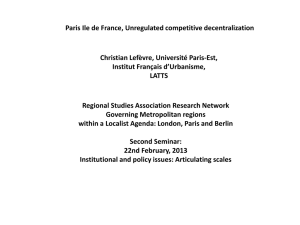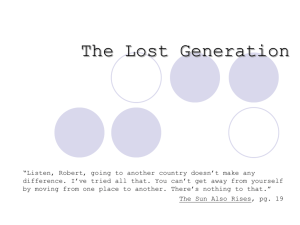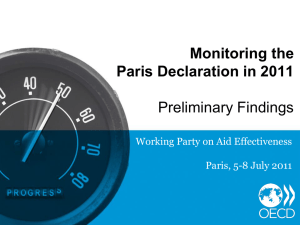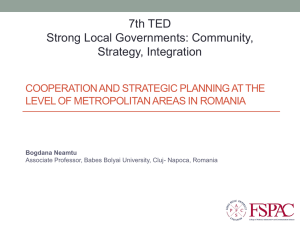POUR UN PARIS PLUS MIXTE? Étude de la nouvelle politique de l
advertisement
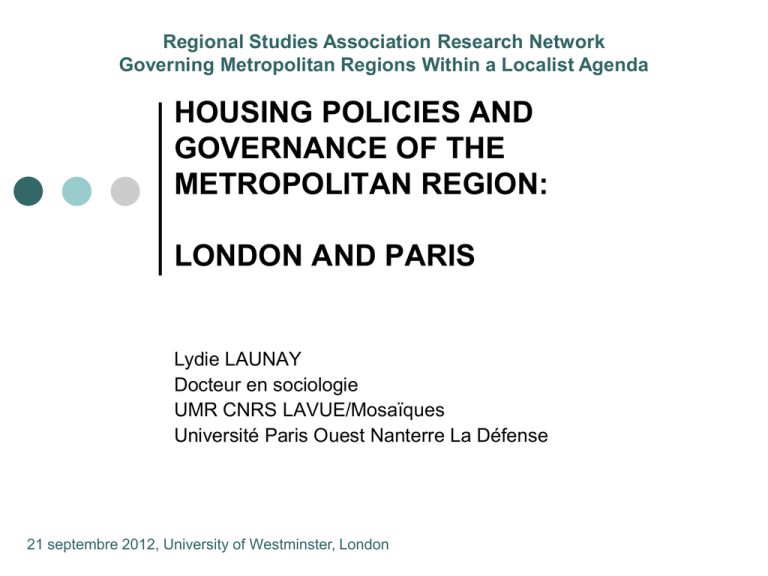
Regional Studies Association Research Network Governing Metropolitan Regions Within a Localist Agenda HOUSING POLICIES AND GOVERNANCE OF THE METROPOLITAN REGION: LONDON AND PARIS Lydie LAUNAY Docteur en sociologie UMR CNRS LAVUE/Mosaïques Université Paris Ouest Nanterre La Défense 21 septembre 2012, University of Westminster, London HOUSING POLICIES AND GOVERNANCE OF THE METROPOLITAN REGION: LONDON AND PARIS Paris/London comparison of housing local policies contributions: -Issues of affordability and segregation -Different political contexts at the national and local levels : no existing metropolitan governance of the Ilede-France -Similarities: notions and policy transfers 1. PROMOTING SOCIAL MIX TO SUPPORT ECONOMIC GROWTH AND SOCIAL COHESION OF THE REGIONS “The danger is social polarisation: a two-track city of increasing wealth and entrenched social exclusion. Housing has a key role to play, in supporting economic growth, in achieving better social inclusion, and in meeting the different needs of London’s diverse communities”. (Mayor of London, 2003, London Housing Strategy, p. 3) « Paris should not become the city for « the richest and the most subsidised » (…) with finally, the gradual disappearance of middle classes, comparing to what is happening in capitals like London. To be balanced and functional, Paris should also permit middle classes, whose also participate to the dynamism of the city, to stay » (Mairie de Paris, Programme local de l’habitat, 2003, p. 10). 1. PROMOTING SOCIAL MIX TO SUPPORT ECONOMIC GROWTH AND SOCIAL COHESION OF THE REGIONS “The danger is social polarisation: a two-track city of increasing wealth and entrenched social exclusion. Housing has a key role to play, in supporting economic growth, in achieving better social inclusion, and in meeting the different needs of London’s diverse communities”. (Mayor of London, 2003, London Housing Strategy, p. 3) « Paris should not become the city for « the richest and the most subsidised » (…) with finally, the gradual disappearance of middle classes, comparing to what is happening in capitals like London. To be balanced and functional, Paris should also permit middle classes, whose also participate to the dynamism of the city, to stay » (Mairie de Paris, Programme local de l’habitat, 2003, p. 10). 2. TWO TYPES OF LOCAL GOVERNING SYSTEM: SIMILARITIES AND DIVERGENCES OF THE HOUSING STRATEGIES Similarities: 1- Affordable housing as a tool and objective of creating « mixed communities »: - - The Plan local de l’Urbanisme (PLU), the Programme local de l’habitat (PLH): 25% of social housing; The London Plan and the London Housing Strategy: 50 private /50 affordable 2- Central governments: key actors on planning 2. TWO TYPES OF LOCAL GOVERNING SYSTEM: SIMILARITIES AND DIVERGENCES OF THE HOUSING STRATEGIES Divergences: 1- Reforms of national housing policies: - London: Mix tenure Paris: mainly social rented (not affordable ownership) 2- Local governance: - Cooperation between GLA and boroughs Domination of Mayor of Paris and its housing service on arrondissements 3. A NEW METROPOLITAN GOVERNANCE FOR THE ILE-DE-FRANCE? THE CREATION OF THE AUTORITÉ ORGANISATRICE DU LOGEMENT (AOL) - A project of Paris Metropole - Housing strategy for the region: - - Planning document: the Programme Regional de l’Habitat; Financial balancing out; Elected metropolitan Authority: AOL 3. A NEW METROPOLITAN GOVERNANCE FOR THE ILE-DE-FRANCE? THE CREATION OF THE AUTORITÉ ORGANISATRICE DU LOGEMENT (AOL) Strong Incertainties: - Concrete involvements and agreements between local actors - Multiplicity of local actors and entanglement of institutional competences (councils and inter-communalités: main actors) - Implications and tensions with central government: Grand Paris through the Contrats de développement Territorial 3. A NEW METROPOLITAN GOVERNANCE FOR THE ILE-DE-FRANCE? THE CREATION OF THE AUTORITÉ ORGANISATRICE DU LOGEMENT (AOL) HOUSING POLICIES AND GOVERNANCE OF THE METROPOLITAN REGION: LONDON AND PARIS - Issue of leadership - Effects of political scene, games of power and alliances at the local and national levels - The AOL: 4 conditions to build a leadership (as GLA): 1- « To develop and to tell a coherent vision of the future, 2- To form alliances with actors who have to support and implement this vision, 3- To drive the process, 4- To legitimate in the eyes of the greatest number » (Christian Lefebvre, 2012).
